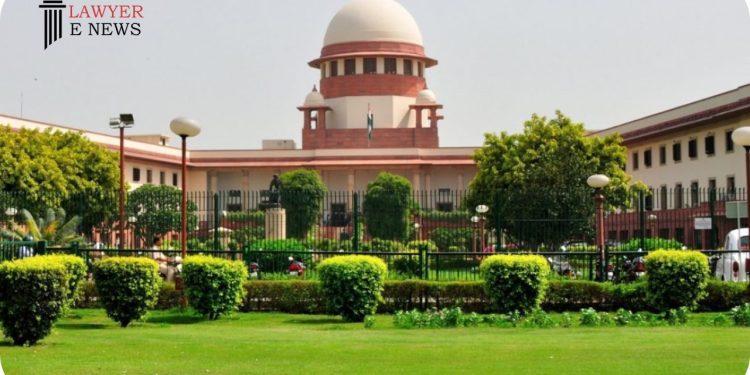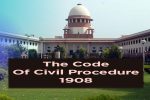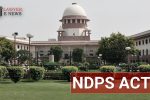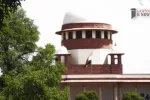Constitution Bench Sets Guidelines for Summoning Additional Accused- Sec 319 CrPC

Guidelines for Summoning Additional Accused During Trial Under Section 319 CrPC were established by the Supreme Court on Monday. The appeal challenging the decision made by the P & H HC, wherein the HC dismissed the Criminal Revision Petitions and upheld the order passed by the Trial Court summoning the appellant as an additional accused by exercising the power under Section 319 of the CrPC, was being heard by the bench of Justices S. Abdul Nazeer, B.R. Gavai, A.S. Bopanna, V. Ramasubramanian, and B.V. Nagarathna.
The situation in this case is that a FIR was filed against 11 accused for the offence under Sections 21, 24, 25, 27, 28, 29, and 30 of the NDPS, Section 25-A of the Arms Act, and Section 66 of the IT Act. This is the situation that led to the appellant being summoned.
Ten defendants were named in the charge sheet and tried in the Sessions Case. Despite the fact that the police filed a second charge sheet, the appellant was not included as an accused party.
Following the initial recording of the evidence, the prosecution submitted a request for the recall of PW-4 and PW-5 under Section 311 of the CrPC, which was approved. The prosecution then submitted a request under Section 319 of the Criminal Procedure Code in the aforementioned Sessions Case for the summons of an additional 5 accused, including the appellant.
Sessions Case proceedings were against 10 of the 11 accused, and because one of the accused wasn’t present, the case in that regard was divided (bifurcated).
The Sessions Judge issued a ruling about the proceedings against the 10 accused, whereby 9 of the accused were found guilty and 1 accused was exonerated.
On the same day, the Sessions Judge also approved the application submitted in accordance with Section 319 of the CrPC and called the appellant to court.
The summons was challenged by the appellant because, in his view, it was not issued in connection with a case that was still before the Sessions Court and since the judgement of conviction and sentence had already been rendered at the time the summons was issued by the Sessions Judge.
Whether the trial court has the authority under Section 319 of the CrPC to summon additional accused when the trial involving other co-accused has concluded and the judgement of conviction has been rendered on the same date before issuing the summoning order was the question up for discussion before the bench.
The bench ruled that “while considering the application under Section 319 of CrPC, the conclusion of the trial by pronouncing the judgement is required to be withheld and the application under Section 319 of CrPC is required to be disposed of and only then the conclusion of the judgement, either to convict the other accused or not, is required.” This is the case because Section 319 of the Criminal Procedure Code only allows for the use of this authority prior to the trial’s conclusion by passing a judgement of conviction and sentence.
According to the Supreme Court, a request made pursuant to Section 319 of the CrPC or a court order summoning an additional accused in an earlier main trial if such an order is made in the earlier concluded trial against the other accused will not be valid if the trial against the absconding accused is split up (bifurcated) and is ongoing. This is true because the Court must employ this authority based on the evidence that has been filed in the case that implicates the accused person whose summons is being requested. If the trial in the split-up (bifurcated) case begins after securing the presence of the missing accused, and if the evidence therein indicates that another person may have been involved, as allowed by Section 319 of the Criminal Procedure Code, the power to summon the accused may undoubtedly be used in the split-up (bifurcated) case prior to the trial’s conclusion.
The bench stated, “Where there is a judgement of conviction of the accused, the power under Section 319 of the CrPC has to be invoked and utilised before the announcement of the order of punishment. In the event of an acquittal, the authority should be used prior to the pronouncement of the acquittal order. As a result, the summons order must come before the trial is over and, in the event of a conviction, the sentence is imposed. If the summoning order is issued after the decision of acquittal or the order imposing sentence in the case of conviction, it will not be upheld. If the order is issued on the same day, it must be evaluated in light of the facts and circumstances of each case.
After ensuring the presence of an evading defendant, the Supreme Court ruled that the trial court had the authority to summon further defendants, provided that there was evidence from the split-up (bifurcated) trial that the defendant sought to be summoned was involved. However, if this authority was not used in the main trial until it was over, the evidence that was documented in the main trial that was ended cannot serve as the foundation for the summoning order.
In light of the foregoing, the bench instructed the Registry to get directions from the Chief Justice and present the pertinent Bench with the case’s factual issues for adjudication against the backdrop of the legal situation and merits-based arguments.
Sukhpal Singh Khaira
vs
The State of Punjab






